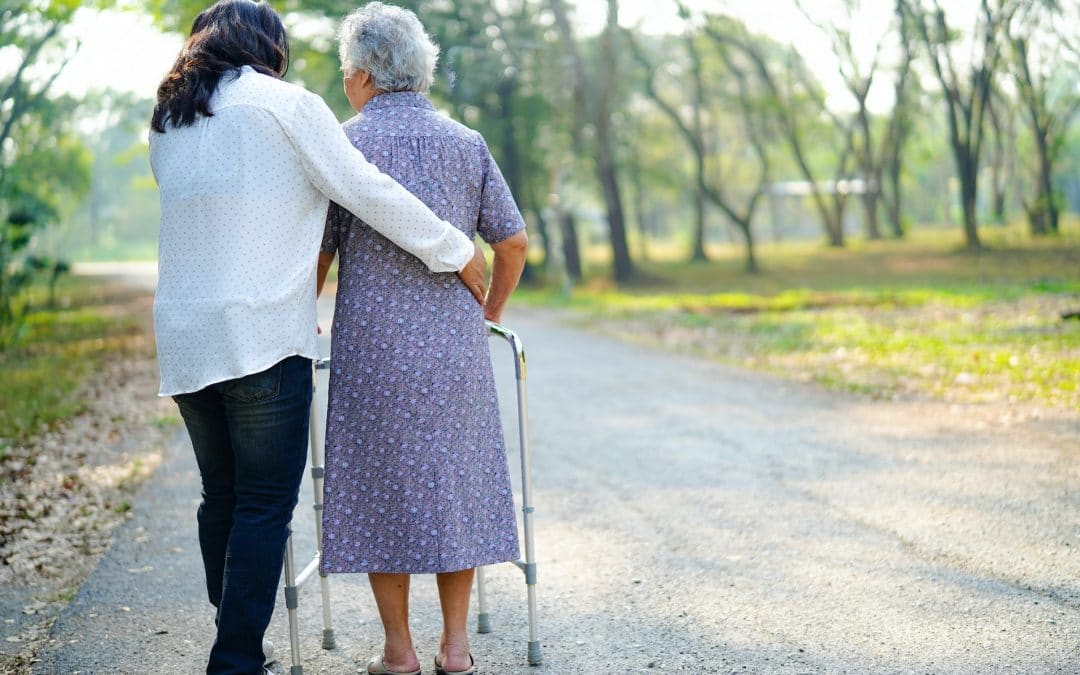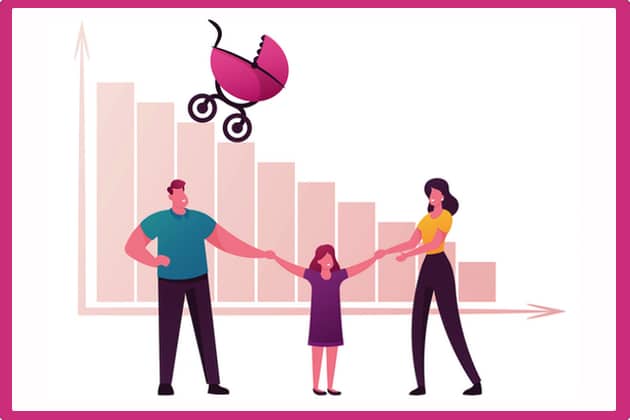
by Alliance VITA | January 29, 2021 | End of life, News, Old age and Dependency
Prior to his election as French President, the “Advanced Age and Autonomy Act” was part of Emmanuel Macron’s campaign promises. However, since it was tabled in autumn 2019, this bill has repeatedly been postponed.
As Alliance VITA indicated in its September 2020 analysis, it appeared as though the Covid pandemic might finally put the reform on the fast-track. During his visit to an “EPHAD” (nursing home establishments for aged and dependent individuals) President Macron declared at the time: “This virus has sometimes reminded us that we must cope with death and vulnerability, and it has shown us that we are more vulnerable at a certain age. It has led us to acknowledge that our population is aging. This means our response has to be adjusted.”
Nonetheless, on January 13, 2021, when the government resumed its’ work after the holidays, spokesman Gabriel Attal mentioned that the Advanced Age and Autonomy Act would be postponed yet again. This was confirmed a week later by the Minister for Autonomy, Brigitte Bourguignon, at the 13th National Symposium for the Elderly known as the “FNADEPA” (National Federation of Directors of Institutions and Services for the Elderly). She said: “The bill remains a priority for this presidential term, as soon as the pandemic situation allows. »
This latest postponement is worrying the professionals who have been confronted with funding and operating difficulties for years. Four different federations which organize various forms of aid, support, care and home services ( Adedom, ADMR, FNAAFP/CSF and UNA) lamented in a press release: “Over 80% of the French want to remain at home as they grow older. Granting this request is currently impossible due to staff shortages and insufficient funding budgeted for the elderly, the disabled, or families experiencing hardships. Home care and home healthcare have been neglected by the public authorities for too many years, and an ambitious reform bill and appropriate funding are urgently needed to continue to help the most vulnerable.”
On January 27th, these federations launched an awareness campaign inviting the French citizens to ask their elected representatives via this platform to fulfill three demands:
- To enact an Advanced Age and Operational Autonomy Act before summer, 2021.
- To better respect home healthcare professions: “How can our profession be belittled, when we are essential to maintaining social networks! ».
- To provide public funding more adapted to the needs of dependent, elderly or disabled people; needs which are continually increasing due to an ageing population.
It is a question of priorities. Is the government willing to focus on the issue of loss of autonomy (both at home and in health care establishments) by providing people with the assistance that the health crisis revealed to be essential?

by Alliance VITA | January 27, 2021 | News, Euthanasia and Suicide
The Portuguese Parliament has scheduled the debate and vote on the euthanasia bill for January 29, 2021. The timing has been highly criticized since the country is currently experiencing a raging Covid pandemic, to the point that the nation is considering petitioning European reinforcement to assist its’ national health care service.
Last year on February 20, 2020, five euthanasia bills, submitted by several socialist parties, had been adopted on first reading, and were to be consolidated into a single text before moving the legislation forward. Previously in May 2018, lawmakers rejected a similar attempt to pass a euthanasia bill. At that time, an opinion poll published just a few days prior to the vote showed that only 7% of the Portuguese population was in favor of euthanasia, while 89% of those questioned preferred palliative care and assistance in the event of serious illness.
On October 23, 2000 the parliament’s left-wing majority rejected a referendum on euthanasia, despite widespread support and over 95,000 signatures. The fact that parliament refused to act on the referendum is an ominous sign that lawmakers may continue to insist on passing this bill, despite the public’s opposition.
Under lockdown since January 15, Portugal is facing an unprecedented health crisis, with record mortality rates due to Covid. An article published on January 27, 2021 in “Les Echos” declares: “With a population of 10.3 million, Portugal is one of the European countries the hardest hit by the second wave. Last week there were 849 Covid cases per 100,000 inhabitants, and the number of cases continues to rise dramatically.”
A growing number of Portuguese caregivers are criticizing the disastrous condition of the nation’s health care service. On January 19, in a recent Facebook video, Dr. Ricardo Baptista Leite, who practices as a volunteer at Caiscais Hospital, near Lisbon compares the situation to a war zone. Dr Leite who is also an MP declares: “It’s impossible to care for all the patients simultaneously. There are such difficult decisions to make, based on predicting which patient will die, regardless of the treatment. It is appalling to see medical teams compelled to prioritize care based on which patients are most likely to live.”
Another complication to managing the current health care crisis is that palliative care is underdeveloped in Portugal, and thus unavailable to 70% of those who should benefit from it.
The grass-roots movement “Stop Euthanasia ” has launched a campaign called “Humanize Portugal” urgently demanding appropriate care and assistance for vulnerable people at the end of life, and by condemning the disrespect and inhumanity of euthanasia.
Seeing this bill being pushed forward under these indecent and catastrophic conditions, while caregivers and the population are fighting to save lives, Alliance VITA calls on Portuguese parliamentarians to resolutely withdraw the euthanasia bill out of respect for human dignity.

by Alliance VITA | January 21, 2021 | News, Family, Maternity
The annual demographic report for 2020 published by the National Institute of Statistics and Economic Studies (“INSEE”) shows yet again a decrease in birth rates in France.
The “INSEE” reported: ” For the past six consecutive years the birth rate has continuously fallen. In 2020, 740,000 babies were born in France, meaning a drop by 1.8% or 13,000 fewer births than in 2019. The total fertility rate, or the sum of age-specific fertility rates, fell in 2020 with 1.84 children per woman compared to 1.86 in 2019. Between 2006 and 2014, the rate was approximately 2 births per woman, although 2.1 is considered to be the threshold for population renewal. The average age of motherhood which is now close to age 31 (30.7) should also be taken into consideration.”
Despite this constant decline in births for the past several years, the latest survey published on January 14th this year, by the National Union of Associations for Families (“UNAF”), revealed that the French would like to have more children.
![[Press Release]: Unfounded Abortion Bill Rejected in France](https://www.alliancevita.org/wp-content/uploads/2021/01/PPL-IVG-Senat-1080x675.jpg)
by Alliance VITA | January 20, 2021 | Abortion, Press Releases
Alliance VITA takes note that the French Senate rejected the latest pro-abortion reform “to extend abortion rights.”
Since abortions have reached record high numbers in France, it is particularly ironic and unfair to use the Covid pandemic as a pretext to table even more permissive abortion legislation.
The proposed bill essentially intended to destroy the remnants of any precautionary legal guidelines: by extending deadlines from 12 to 14 weeks, as well as abolishing the conscience clause for health professionals, without providing any measures whatsoever to prevent more abortions.
Caroline Roux, Alliance VITA’s Assistant General Delegate declares:
“When already confronted with unplanned pregnancies, women shouldn’t also have to face ideological hurdles. Recent statistics from the French National Institute of Demographic Research (INED) have reported that women with the lowest standard of living are much more likely to have abortions. The general public appears to be largely unconcerned by pregnant women in distress or by couples who experience complicated pregnancies. Previous measures which took abortion-related difficulties into account have been gradually phased out by successive reforms, including: the distress criteria, the reflection period for cooling-off, making information available on pregnant women’s rights and the potential maternity benefits offered. Indeed, women are frequently left alone to make a solitary decision, which is far from trivial. Furthermore, they often experience pressure to abort from men. Alliance VITA is calling on the government to conduct an unbiased epidemiological study on the causes, conditions and consequences of abortion over the past 20 years. This is an essential prerequisite for organizing a real debate focused on implementing a genuine abortion prevention policy.”

by Alliance VITA | January 16, 2021 | News, Family, Maternity
The latest survey by the National Union of Family Associations (“UNAF”) published on 14 January 2021, reports that the French want to have more children.
According to the report soon to be published by the French National Institute for Statistics and Economic Studies (INSEE), there have been 100,000 fewer births every year for the past ten years. Such a persistent decline in birth rates has not existed since 1945, and this has become an issue for the general balance of the French social security.
The survey shows that the French are yearning to have more children. “When 90% of people say they want, or would have wanted, at least one child, 83% at least 2 children, and 36% at least 3 children, public authorities and the general public should examine what can be done to help make these wishes come true.”
According to those surveyed: “On average, respondents want, or would have wanted, 2.39 children – meaning 0.58 more than the actual number of children they have had so far, and which is also 0.56 more than the current birth rate index reported by INSEE.” In 2019, the average birth index was only 1.87.
Families are facing material and financial problems which keep them from having more children, such as having access to decent, long-term housing and finding stable employment with work schedules which facilitate the balance between work and home life. Parents are increasingly penalized by significant budget cuts in government subsidies and a growing portion of the family budget goes towards housing.
The UNAF regularly investigates this issue, to draw attention to the government’s policy for families and to call for improvements.




![[Press Release]: Unfounded Abortion Bill Rejected in France](https://www.alliancevita.org/wp-content/uploads/2021/01/PPL-IVG-Senat-1080x675.jpg)
